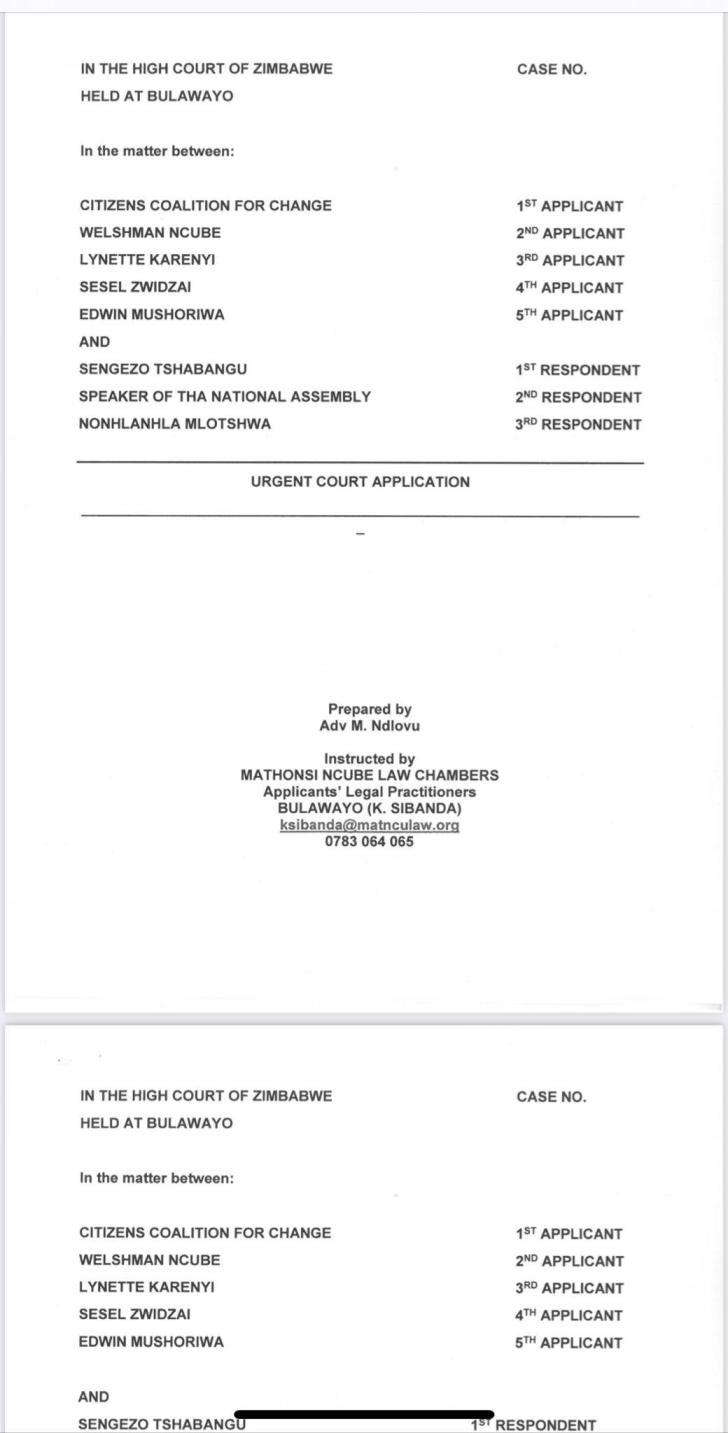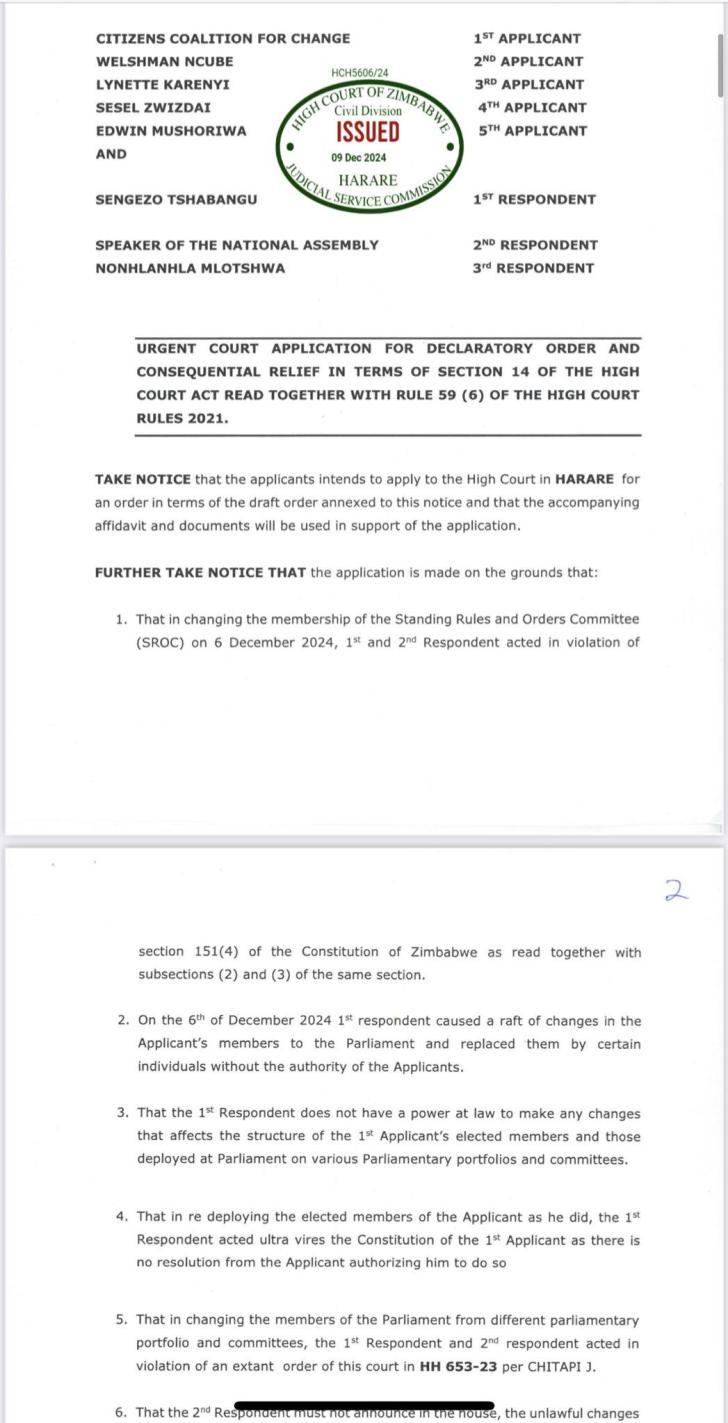News / National
Welshman Ncube's CCC takes Tshabangu to court
10 Dec 2024 at 11:32hrs |
0 Views

The Citizens Coalition for Change (CCC), under the leadership of Welshman Ncube, has taken Secretary General Sengenzo Tshabangu to court over a contentious parliamentary reshuffle that saw Karenyi Kore dislodged as Leader of the Opposition. The CCC claims Tshabangu acted without authority, breaching both party and constitutional protocols.
The court application, filed by the CCC, accuses Tshabangu of unilaterally orchestrating changes to the party's parliamentary representation, including adjustments to the Standing Rules and Orders Committee (SROC), without approval from the party's leadership or structures. This reshuffle, conducted on December 6, 2024, has ignited a legal and political battle within the opposition party.
The CCC's legal filing highlights several alleged violations by Tshabangu and the second respondent, Parliament's presiding officer. The application asserts the following:
1. Constitutional Breach: Tshabangu and the second respondent violated Section 151(4) of the Constitution of Zimbabwe by altering the membership of the SROC without adherence to constitutional procedures.
2. Unilateral Action: Tshabangu made substantial changes to CCC parliamentary representatives, replacing them with new individuals without the party's authorization.
3. Ultra Vires Actions: Tshabangu is accused of acting beyond his legal powers by re-deploying CCC members in parliamentary roles without a party resolution, thereby violating the party's constitution.
4. Defiance of a Court Order: The reshuffle is alleged to contravene an existing court order issued in HH 653-23 by Justice Chitapi, which governs parliamentary deployments.
5. Impact on Parliamentary Announcements: The CCC argues that Parliament must refrain from recognizing or announcing the changes orchestrated by Tshabangu as they are unlawful.
The reshuffle has heightened tensions within the CCC, which has been grappling with internal divisions since its formation. Karenyi Kore's removal as Leader of the Opposition has sparked widespread criticism from CCC loyalists, who see the move as undermining party cohesion and leadership structures.
Secretary General Tshabangu, often described as a controversial figure within the party, has defended his actions, arguing that they were necessary to ensure effective parliamentary representation. However, critics claim his actions reflect deeper factional struggles within the CCC.
The CCC's legal team is seeking an urgent court order to nullify the reshuffle and bar Parliament from implementing Tshabangu's changes. The case will test the boundaries of party constitutions in relation to Zimbabwe's parliamentary rules and the role of the courts in resolving internal political disputes.
Political analysts view the case as pivotal for the CCC's stability and its ability to present a unified front against ZANU-PF in future elections. The outcome could set a precedent for how political parties navigate internal governance disputes in the context of Zimbabwe's parliamentary system.
As the case heads to court, both sides are expected to present their arguments in the coming days. For the CCC, the battle is not just about parliamentary roles but about asserting authority and upholding the rule of law within its ranks. For Tshabangu, it is an opportunity to justify his actions as aligned with the party's broader goals.
With tensions running high and the stakes equally significant, the court's decision could redefine the dynamics within Zimbabwe's leading opposition party.


The court application, filed by the CCC, accuses Tshabangu of unilaterally orchestrating changes to the party's parliamentary representation, including adjustments to the Standing Rules and Orders Committee (SROC), without approval from the party's leadership or structures. This reshuffle, conducted on December 6, 2024, has ignited a legal and political battle within the opposition party.
The CCC's legal filing highlights several alleged violations by Tshabangu and the second respondent, Parliament's presiding officer. The application asserts the following:
1. Constitutional Breach: Tshabangu and the second respondent violated Section 151(4) of the Constitution of Zimbabwe by altering the membership of the SROC without adherence to constitutional procedures.
2. Unilateral Action: Tshabangu made substantial changes to CCC parliamentary representatives, replacing them with new individuals without the party's authorization.
3. Ultra Vires Actions: Tshabangu is accused of acting beyond his legal powers by re-deploying CCC members in parliamentary roles without a party resolution, thereby violating the party's constitution.
4. Defiance of a Court Order: The reshuffle is alleged to contravene an existing court order issued in HH 653-23 by Justice Chitapi, which governs parliamentary deployments.
5. Impact on Parliamentary Announcements: The CCC argues that Parliament must refrain from recognizing or announcing the changes orchestrated by Tshabangu as they are unlawful.
Secretary General Tshabangu, often described as a controversial figure within the party, has defended his actions, arguing that they were necessary to ensure effective parliamentary representation. However, critics claim his actions reflect deeper factional struggles within the CCC.
The CCC's legal team is seeking an urgent court order to nullify the reshuffle and bar Parliament from implementing Tshabangu's changes. The case will test the boundaries of party constitutions in relation to Zimbabwe's parliamentary rules and the role of the courts in resolving internal political disputes.
Political analysts view the case as pivotal for the CCC's stability and its ability to present a unified front against ZANU-PF in future elections. The outcome could set a precedent for how political parties navigate internal governance disputes in the context of Zimbabwe's parliamentary system.
As the case heads to court, both sides are expected to present their arguments in the coming days. For the CCC, the battle is not just about parliamentary roles but about asserting authority and upholding the rule of law within its ranks. For Tshabangu, it is an opportunity to justify his actions as aligned with the party's broader goals.
With tensions running high and the stakes equally significant, the court's decision could redefine the dynamics within Zimbabwe's leading opposition party.


Source - byo24news
Join the discussion
Loading comments…





































